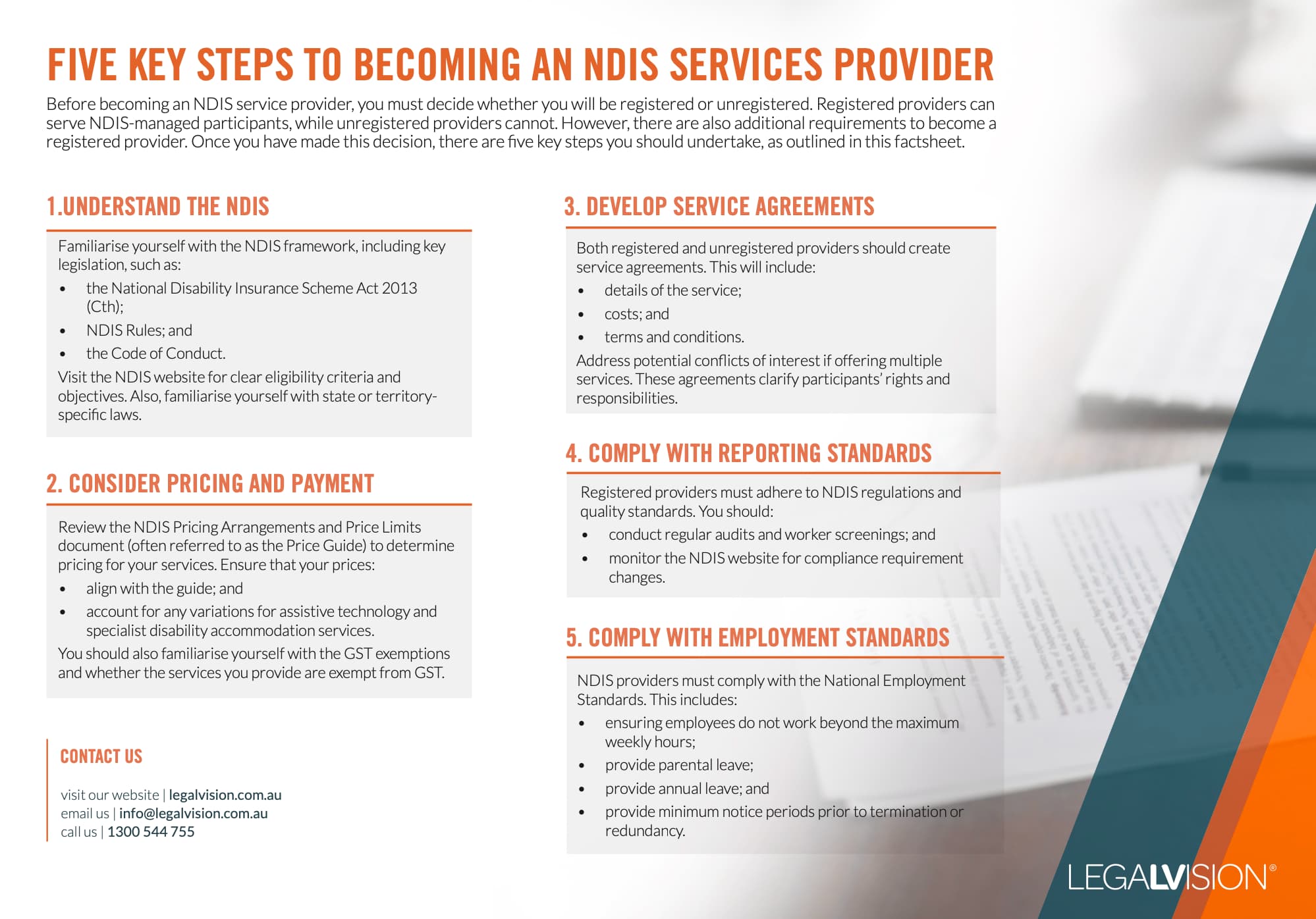In Short
- NDIS workers must promptly report incidents affecting the health or safety of participants, including abuse, neglect, or exploitation.
- Registered NDIS providers are required to have systems in place for managing and reporting incidents to the NDIS Commission.
- Both registered and unregistered providers must adhere to the NDIS Code of Conduct, ensuring quality and safety in support services.
Tips for Businesses
Implement a robust incident management system to ensure compliance with NDIS reporting obligations. Regularly train staff on recognising and reporting incidents, and maintain clear documentation to support transparency and accountability. Adhering to these practices safeguards participants and upholds your organisation’s integrity.
The National Disability Insurance Scheme (NDIS) is pivotal in ensuring NDIS participants receive the necessary care and assistance. A pivotal aspect for those receiving funding from the NDIS is the role of support workers who provide services to clients with disability. Mandatory reporting requirements are an integral part of the responsibilities of these providers. They aim to safeguard the rights and dignity of those receiving NDIS services. Due to the nature of their work, service providers are most likely to witness an incident. They may also have something disclosed to them by a patient.
This article will explain the mandatory reporting obligations for NDIS workers, ensuring compliance and safeguarding the rights of participants.
Registered NDIS Providers
The National Disability Insurance Scheme (Incident Management and Reportable Incidents) Rules 2018 (NDIS Rules) sets out the guidelines for handling and reporting incidents. These incidents may impact the health or safety of people with disabilities receiving NDIS support. The rules establish specific requirements for registered NDIS providers. This includes protocols for handling, managing, and notifying the NDIS Commission about reportable incidents.
Registered or Unregistered Providers
Under the NDIS Code of Conduct, which applies to both registered and unregistered providers, all providers should act promptly. They must take steps to raise and act on concerns that could impact the quality and safety of support. This applies to support provided to people with disability. Providers must take all reasonable steps to prevent and respond to all forms of violence, exploitation, neglect, and abuse.
Continue reading this article below the formWhat Incidents are Reportable?
A ‘reportable incident’ under the NDIS Rules includes:
- the death of a person with a disability;
- serious injury of a person with disability;
- abuse or neglect of a person with a disability;
- unlawful sexual or physical contact with or assault of a person with a disability; and
- any unauthorised use of restrictive practices in relation to the person with a disability.
The NDIS Rules state that registered providers must report abuse and neglect within 24 hours of providing support. The term ‘in connection with’ means these incidents could happen during or due to the services provided. This includes incidents occurring while participants receive services, when services change, or when services end. It also includes incidents outside of service provision if they result from the services. Additional reporting requirements may differ depending on the state or territory where services are provided. For instance, the legislation for reporting sexual abuse of children varies across Australian states and territories.
Reporting the Incident
Whether an event is a reportable incident is a delicate and vital decision for a provider. A participant’s privacy should be a relevant concern. Assess each event individually. Decide on a course of action based on the details of each instance of abuse or suspected abuse. Report all mandatory events.
Additional Reporting Information
In addition to the reporting obligations discussed, allied health practitioners may have additional obligations beyond those under NDIS legislation. These include psychologists, social workers, and occupational therapists. These professionals often work closely with vulnerable groups. Their specialised roles involve heightened responsibilities for identifying and reporting abuse or neglect.
Mandatory reporting requirements for providers are a vital component of ensuring the safety and well-being of NDIS participants. By understanding and adhering to their reporting obligations, support workers play a crucial role in protecting vulnerable individuals and holding service providers accountable. The reporting requirements remain essential to maintaining the integrity of the NDIS and upholding the rights of those it serves.

Understand five key steps you should know to become an NDIS service provider with this free LegalVision factsheet.
Key Takeaways
Mandatory reporting requirements are crucial for safeguarding NDIS participants’ rights and dignity. Therefore, support workers play a vital role in identifying and reporting incidents. Additionally, registered providers must report incidents of death, serious injury, abuse, neglect, unlawful contact, or unauthorised restrictive practices within 24 hours. However, reporting requirements may vary depending on the provider’s registration status, professional role, and the state or territory where services are provided.
If you need help with your reporting obligations as an NDIS worker, our experienced NDIS lawyers can assist as part of our LegalVision membership. For a low monthly fee, you will have unlimited access to lawyers to answer your questions and draft and review your documents. Call us today on 1300 544 755 or visit our membership page.
Frequently Asked Questions
The main reportable incidents include the death of a person with a disability, serious injury of a person with disability, abuse or neglect of a person with disability, and unlawful sexual or physical contact with or assault of a person with disability. Registered providers must report these incidents within 24 hours if they occur in connection with providing support. Report any unauthorised use of restrictive practices within 5 business days. If the incident results in harm to a person with a disability, report it within 24 hours.
While the NDIS Rules apply to registered providers, registered and unregistered providers are subject to the NDIS Code of Conduct. This code requires all providers to promptly raise and act on concerns about matters that might impact the quality and safety of support provided to people with disability. They must also take all reasonable steps to prevent and respond to all forms of violence, exploitation, neglect, and abuse.
Yes, additional reporting requirements depend on various factors. Allied health practitioners such as psychologists, social workers, and occupational therapists may have reporting obligations beyond those mandated under NDIS legislation. Additionally, reporting requirements can vary by state or territory, particularly for incidents like sexual abuse of children. Additionally, when an adult suspects that someone may commit criminal acts, especially against a vulnerable person, they may be required to report this information to the police.
We appreciate your feedback – your submission has been successfully received.












